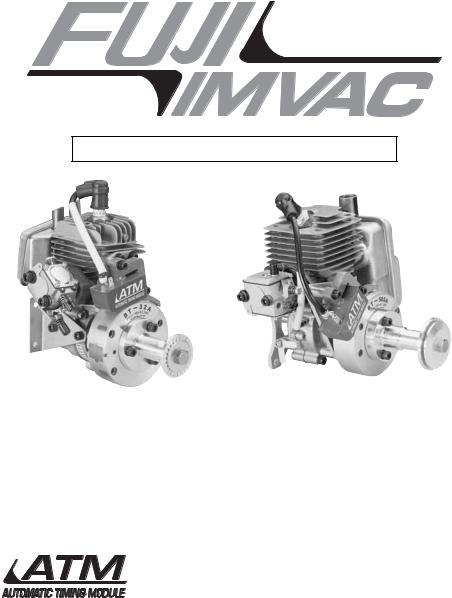FUJI-IMVAC BT-32A, BT-50S-A Operator’s Manual

™
Operator's Manual for BT-32A and BT-50S-A
Specifications for BT-32A |
Specifications for BT-50S-A |
||
Displacement: 1.95cu. in. [32cc] |
Displacement: 3.0cu. in. [50cc] |
||
Horsepower: |
2.2hp / 10,000rpm |
Horsepower: |
5.2hp / 10,000rpm |
Ignition Style: CDI Automatic |
Ignition Style: CDI Automatic |
||
|
Ignition Timing |
|
Ignition Timing |
R.P.M.: |
1200 – 10,000rpm |
R.P.M.: |
1200 – 10,000rpm |
Fuel: |
Gas/2-cycle Engine Oil |
Fuel: |
Gas/2-cycle Engine Oil |
Weight: |
3.1 lb [1.7kg] w/oMuffler |
Weight: |
4.2 lb [1.9kg] w/oMuffler |
Both engines feature an electronic ignition system. This system gradually delays the ignition timing according to the number of ignition pulses, increasing with the engine
speed. The fuel mixture is ignited at almost top dead center when idling and the timing is gradually increased as the revolutions increase.
Manufactured by FUJI-IMVAC INC.
YOKOHAMA, 235-0005 JAPAN
Worldwide Distributor (except Japan): Hobbico, INC.
Champaign, IL 61826 USA
www.fuji-imvac.com
Fuji-Imvac is not related to the original Fuji Engines sold by Mecoa.
Entire Contents © Copyright 2009 |
FJIZ3250 for FJIG0032 & FJIG0050 V2 |
BEFORE OPERATION
1.Check to see that all screws and bolts are tight. Check carefully for any cracked, broken or missing parts. Tighten or replace before proceeding.
2.Do not operate engine in a closed room or where ventilation is not adequate.
3.Check to see that there are no foreign objects in the path of the propeller.
Secure any loose articles of clothing so they cannot be drawn into the propeller.
4.Prepare only the amount of gasoline needed. Aged gasoline could damage the engine and cause it to overheat.
5.Mix gasoline with 2 cycle oil only in the ratio of 40 parts gasoline to 1 part oil (break-in ratio is 25 to 1.) Using fuel with an incorrect fuel/oil ratio or with oil not intended for 2 cycle engines could cause damage and allow the engine to overheat. Filter the fuel to eliminate foreign matter by using an appropriate filter.
6.Always allow engine to cool prior to refueling.
Break-in Operation
Operate engine for about one hour with a fuel mixture that contains a 25:1 fuel/oil ratio. Do not break in by opening the high-speed needle on the carburetor. Carbon will accumulate in the spark plug, which will make ignition difficult. (There is no problem if break-in is done by flying the engine.)
STARTING PROCEDURES
Manual Starting:
1.Make sure the ignition is OFF. Close the choke plate on the carburetor and open the throttle slightly from the idle position.
2.Rotate the propeller slowly about 10 to 20 times (more in Winter) until fuel begins to move to the carburetor. (Swing the prop one-half turn to move the piston from top dead center to bottom dead center, and then back to top dead center repeatedly. Opposite rotation can also prime the carburetor.)
3.Turn the ignition ON and flip the propeller several times briskly.
4.Turn the choke lever to the OPEN position after you hear an initial firing and the engine stops. You can squirt gasoline directly into the carburetor if the engine does not fire.
5.Rapidly flip the propeller until the engine starts. If the engine does not start,
repeat the steps 1-4.
2
6.After starting, let the engine idle for two to three minutes. Open and close the throttle until the engine runs smoothly at idle and at full throttle. Acceleration should also be smooth.
Safety Warnings:
For manual starting, make sure the propeller is properly adjusted on the propeller shaft to allow you to rotate the flywheel past the ignition coil at the highest possible speed during starting. Flip the prop rapidly from the point where you can first feel the compression.
Warning: Gasoline is volatile and flammable. Gasoline should be stored in an approved container, away from heat or open flames. Do not smoke near gasoline. Use caution when transporting gasoline and take precautions when fueling your engine.
Starting With Optional Spring Starter BT-32A (FJIG1032) BT-50S-A (FJIG1050)
1.With the ignition OFF, close the choke plate on the carburetor and open the throttle slightly from the idle position.
2.Rotate the propeller slowly about 10 to 20 times (more in Winter) until fuel begins to move to the carburetor. (Swing the prop one-half turn to move the piston from top dead center to bottom dead center, and then back to top dead center repeatedly. Opposite rotation can also prime the carburetor but will not be possible when using the spring starter.)
3.Turn the ignition ON. Hold the propeller, turn it clockwise 360° (one rotation) and let it go. Turn the choke lever to the OPEN position after you hear an initial firing and the engine stops. You can squirt gasoline directly into the carburetor if the engine does not fire. Repeat steps 1,2, & 3 above, as necessary.
Starting With Optional Electric Starter (Onboard type or External type)
1.With the ignition OFF, close the choke plate on the carburetor and open the throttle slightly from the idle position.
2.Turn the propeller with the starter for a few seconds until fuel begins to move to the carburetor.
3.Turn the ignition ON. Turn the propeller with the starter.
4.Turn the choke lever to the OPEN position after you hear an initial firing and the engine stops. You can squirt gasoline directly into the carburetor if the engine
does not fire. Again, turn the propeller with the electric starter.
3
